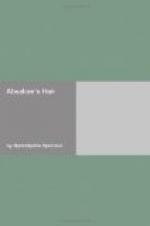A little later, with dirty hands and clothes, his face bathed in perspiration, he rushed up to his mother with the result of his investigations.
“Here is something for you to see.”
She was reading; she looked up and turned as white as a sheet.
“Is that the cement stone?” she asked, as she put down her book.
“Did you know about it?” he exclaimed, in the greatest astonishment.
“Good gracious, yes,” she answered. She walked across to the window, came back again, pressing her hands together. “So you have found it too?”
“Who did before me?”
“Your father, Rafael, your father, the first time that I was here, a little time before we were to leave.” She paused. “He came rushing in as you did just now—not so quickly, not so quickly, he was weak in the legs, but otherwise just like you.” She let her eyes rest, with a peculiar look, on Rafael’s dirty hands. The hands themselves were not well shaped, they were almost exactly his father’s.
Rafael noticed nothing.
“Had he found the bed of cement stone, then?”
“Yes. He locked the door behind him. I got up from my chair and asked him how he dared? He could hardly speak.” She paused for a moment, recalling it all again. “Yes, and it was that stuff.”
“What did he say, mother?”
She had turned to leave the room.
“Your father believed that I had brought luck to the house.”
“And why was it not so, then?”
She faced him quickly. He coloured.
“Pardon, mother, you misunderstood me. I meant, why did it come to nothing about the cement?”
“You did not know your father: there were too many hooks about him for him to be able to carry out anything.”
“Hooks?”
“Yes! eccentricity, egotism, passion, which caught fast in everything.”
“What did he propose to do?”
“No one was to be allowed to have anything to do with it, no one was to know of it, he was to be everything! For this reason the timber was to be cut down and sold; and when we were married—I say when we were married, the whole of my fortune was to be used as well.”
He saw the horror with which she still regarded it; she was passing through the whole struggle again; and he understood that he must not question her further. She made a gesture with her hand; and he asked hurriedly, “Why did you not tell me before, mother?”
“Because it would have brought you no good,” she answered decidedly.
He felt, nay, he saw that she believed that it would bring him no good now. She again raised her hand, and he left her.
When he was once more in the boat, taking his great news to the parsonage, he thought to himself, Here is the reason of my father’s and mother’s deadly enmity.
The cement stone! She did not trust him, she would not give him both herself and her fortune, so there was no cement, nor were any trees felled.




